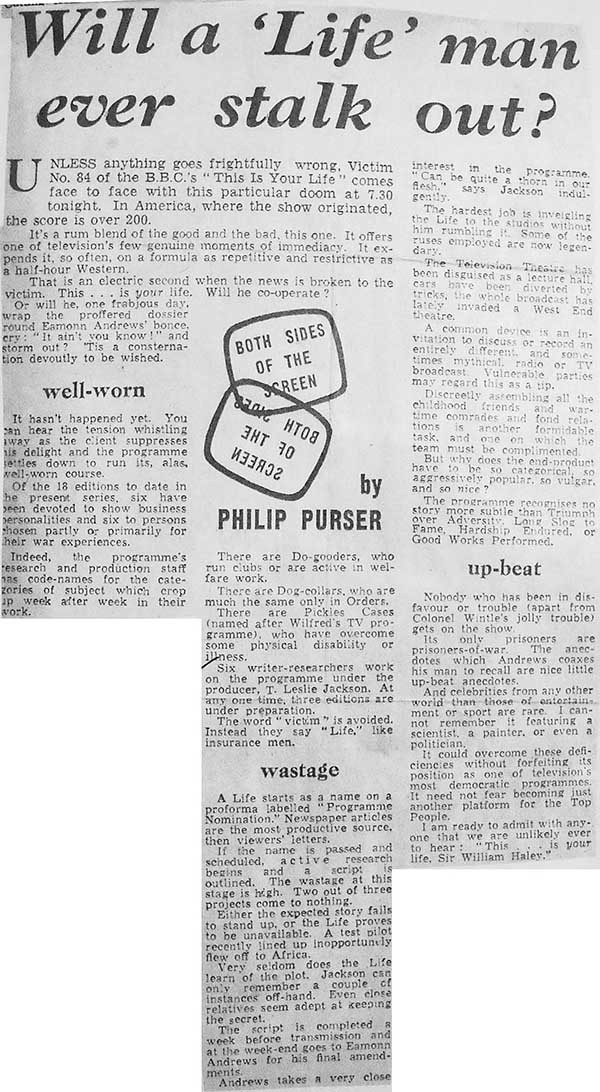Big Red Book
Celebrating television's This Is Your Life
2 February 1959

the producers who steered the programme's success
the studio look and locations
BOTH SIDES OF THE SCREEN by PHILIP PURSER
Unless anything goes frightfully wrong, Victim No. 84 of the BBC's This Is Your Life comes face to face with this particular doom at 7.30 tonight. In America, where the show originated, the score is over 200.
It's a rum blend of the good and the bad, this one. It offers one of television's few genuine moments of immediacy. It expends it, so often, on a formula as repetitive and restrictive as a half-hour Western.
That is an electric second when the news is broken to the victim. This... is your life. Will he co-operate?
Or will he, one frabjous day, wrap the proffered dossier round Eamonn Andrews' bonce, cry: "It ain't you know!" and storm out? 'Tis a consternation devoutly to be wished.
well-worn
It hasn't happened yet. You can hear the tension whistling away as the client suppresses his delight and the programme settles down to run its, alas, well-worn course.
Of the 18 editions to date in the present series, six have been devoted to show business personalities and six to persons chosen partly or primarily for their war experiences.
Indeed, the programme's research and production staff has code-names for the categories of subject which crop up week after week in their work.
There are Do-gooders, who run clubs or are active in welfare work.
There are Dog-collars, who are much the same only in Orders.
There are Pickle Cases (named after Wilfred's TV programme), who have overcome some physical disability or illness.
Six writer-researchers work on the programme under the producer, T Leslie Jackson. At any one time, three editions are under preparation.
The word "victim" is avoided. Instead they say "Life" like insurance men.
wastage
A Life starts as a name on a proforma labelled "Programme Nomination". Newspaper articles are the most productive source, then viewers' letters.
If the name is passed and scheduled, active research begins and a script is outlined. The wastage at this stage is high. Two out of three projects come to nothing.
Either the expected story fails to stand up, or the Life proves to be unavailable. A test pilot recently lined up inopportunely flew off to Africa.
Very seldom does the Life learn of the plot. Jackson can only remember a couple of instances off-hand. Even close relatives seem adept at keeping the secret.
The script is completed a week before transmission and at the weekend goes to Eamonn Andrews for his final amendments.
Andrews takes a very close interest in the programme. "Can be quite a thorn in our flesh," says Jackson indulgently.
The hardest job is inveigling the Life to the studios without him rumbling it. Some of the ruses are now legendary.
The Television Theatre has been disguised as a lecture hall, cars have been diverted by tricks, the whole broadcast has lately invaded a West End theatre.
A common device is an invitation to discuss or record an entirely different, and sometimes mythical, radio or TV broadcast. Vulnerable parties may regard this as a tip.
Discreetly assembling all the childhood friends and wartime comrades and fond relations is another formidable task, and one on which the team must be complimented.
But why does the end product have to be so categorical, so aggressively popular, so vulgar and so nice?
The programme recognises no story more subtle than Triumph over Adversity, Long Slog to Fame, Hardship Endured, or Good Works Performed.
up-beat
Nobody who has been in disfavour or trouble (apart from Colonel Wintle's jolly trouble) gets on the show.
Its only prisoners are prisoners-of-war. The anecdotes which Andrews coaxes his man to recall are nice little up-beat anecdotes.
And celebrities from any other world than those of entertainment or sport are rare. I cannot remember it featuring a scientist, a painter, or even a politician.
It could overcome these deficiencies without forfeiting its position as one of television's most democratic programmes. It need not fear becoming just another platform for the Top People.
I am ready to admit with anyone that we are unlikely ever to hear: "This... is your life, Sir William Haley." (former Director-General of the BBC)